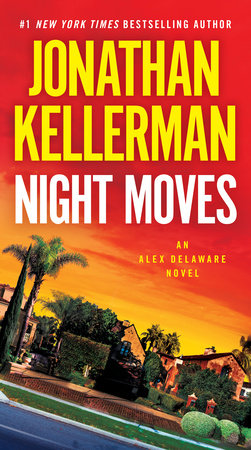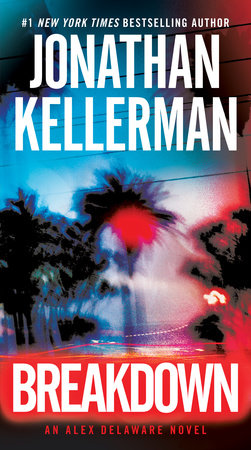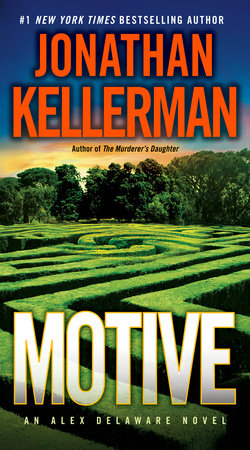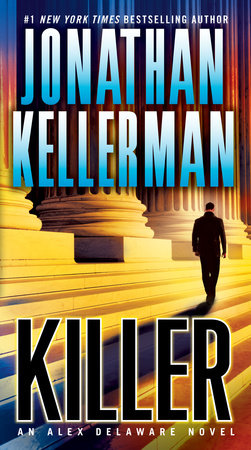Excerpt
Night Moves
CHAPTER 1
Nice house. If you put aside reality.
Sunset Boulevard, Sunday at ten thirty p.m., was an easy ride, cool April air sweetening the Seville’s interior. To get here from my place in Beverly Glen, I’d driven through Bel Air and Brentwood, turned south a quarter mile into Pacific Palisades, continued through tree-lined stretches of architectural revivals: Colonial, Spanish, Mediterranean, Greek, Unidentifiable.
Not a Through Street warnings at most corners; a planned community discouraging casual visitors. GPS-tutored turns led me to a street named Evada Lane, three blocks terminating at a cul-de-sac.
Built-in-the-seventies tract, the Palisades but no palisades in sight. This was flat land, geographically undistinguished, too far from the ocean for someone to smell the brine.
In the Midwest, respectably middle-class real estate. In L.A., not a single structure worth less than a million.
The house garnering all the attention sat at the tip of the dead end like a cherry on a sundae. One of the aspiring Colonials, heralded by white columns, its brick façade strobed red and blue by LAPD cruisers. The same light show played upon a black Range Rover and a gray Lexus sedan in the driveway.
All that wattage courtesy of half a dozen cop cars, circled around a white crypt van waiting to transport. The crime lab van sat nearby, lights off, unoccupied. No sign of the coroner’s investigators; come and gone.
Uniformed officers stood around doing nothing. Radios barked police calls, dispatchers’ voices impersonal as they chronicled the evening’s malice and misfortune.
Soft, spring breeze; the yellow tape billowed.
Just outside the tape, a mud-colored Impala I knew to be Detective Moses Reed’s current ride sat next to a white Porsche 928 in which I’d been a passenger more than once. The off-duty drive shared by Lieutenant Milo Sturgis and his partner, a trauma surgeon named Richard Silverman.
Reed had arrived just over two hours ago, taken one look, and called the boss. Milo, suffering through a charity dinner for Rick’s employer, the Cedars-Sinai E.R., sped over from the Beverly Hilton and called me.
“What’s up?” I said.
“Complicated, see for yourself. Please.”
He met me just outside the front door, wearing a hooded paper suit, booties, and gloves.
“Yeah, I know, I look like a giant sperm. You don’t have to abase yourself, tech’s nearly finished.” He peeled off the suit, revealing a saggy black suit with lapels dating to the house’s construction, a white shirt, and a silver tie that had to be Rick’s.
“Very GQ.”
“The almost-tux?” he said. “Damn banquet, I had to take the pants out three inches, four woulda been better—enough of my problems, let’s go see a real one.”
The paper garb had led me to expect horror and chaos. Milo opened the door on surprising calm.
A two-story entry floored in waxed walnut was centered by a mahogany table hosting a vase of silk roses. A bronze chandelier cast reassuring light. To the left, blandly pleasant landscape paintings filled a white wall; to the right a blue-carpeted staircase traced the ascent to a small landing.
Milo continued straight ahead, toward another wall decorated by sconces and broken by an open doorway.
A form moved into the gap. Moe Reed, young, ruddy, still wearing his paper suit but not the hood. Pink skin showed through his blond buzz cut. The suit was tight in places, power-lifter arms testing the tensile strength of wood pulp.
“L.T., Doc.” Stepping aside.
I followed Milo into a modestly proportioned, nicely set-up living room that ended at a bank of French doors. Through the glass were glimpses of patio furniture, grass, trees. To the left, a dining room and, beyond that, another open doorway that led to a white kitchen.
When people are murdered in their homes, it’s almost always in the bedroom or the kitchen. Milo kept going, crossing the living room and hooking right, toward a closed door.
He knocked.
A female voice said, “Hold on.”
“It’s me again.”
“Just a sec, Lieutenant.”
The door opened on a paper-suited lab tech name-tagged I. Jonas. The mask was pulled down, revealing a young female face the color of hot chocolate. Tweezers in one hand, vial in the other, something black and wormy in the vial.
She said, “Just a few secs and I’ll be gone, sir, but you can come in.”
“Thanks,” said Milo. “I want Dr. Delaware to take a look.”
I. Jonas looked at me. “Pathologist actually came to the scene?”
Milo said, “Different ologist. Psych.”
The tech gave me a longer once-over. “Inez Jonas, Doctor. I’d shake your hand but obviously.” She shifted to the right, gave me a fuller view.
The room was cozy and pine-paneled. What looked to be a library/den/office combo, with a book-filled repro-Victorian case and a matching desk. The desk’s tooled-leather top was bare but for a green-shaded lamp and a glass jar filled with hard candies wrapped in multicolored foil. To the left of the desk was an open area. A plaid sofa and ottoman faced a sixty-inch TV.
That left plenty of floor space for the man lying on hardwood, between the couch and the screen.
Positioned faceup if he’d had a face.
The devastation visited on everything above his neck suggested a shotgun attack, and I asked if that was the case.
Inez Jonas said, “You bet, Doctor, tons of pellets in there.” She frowned as her eyes trailed to where the man’s hands should’ve been. I’d already gotten there.
Dual amputation at the wrists, clean and straight-edged. Stiffness in the limbs.
I said, “Still in rigor.”
Milo nodded. “C.I. says depending on temperature, he was probably killed within twenty-hour hours, probably less. She’s also sure the hands were cut off postmortem because there wasn’t much bleeding at the stumps.”
“Not much blood, period.”
Inez Jonas said, “No kidding. I found a few little drops on the wood just under him, no spatter either high- or low-velocity, just a teeny bit of runoff from here.” Pointing to the neck, which canted to the right. A wispy streak the color of rosé wine trailed down gray flesh.
She held the vial up to Milo. “The other thing I found was this, just before you came back. On the floor, under his butt.”
He squinted. “Plastic?”
“Yes, sir,” said Jonas. “Maybe it’s just random dirt that was already here and his pants picked it up. But I’m thinking it looks like it’s from a garbage bag and that could explain how they got him here, no? ’Cause he sure wasn’t killed here. Or cut up here.”
Milo said, “Done somewhere else, cleaned up meticulously, and bagged. Once he’s here, bad guy does some fine-tuning and takes the bag. Yeah, I like it, good thinking.”
Jonas beamed. “Psycho-crazy thinking but logical if you’re in that orbit.”
Looking at the corpse had made my eyes and teeth hurt so I shifted to a visual scan of the room. But for the corpse, as impeccable as the rest of the house.
I looked down at the poor faceless soul again, trying to ignore the gore and concentrating on the mundane details that sometimes tell you plenty.
Not tonight.
Medium height, medium build, age impossible to discern but thinning sandy hair and a bald spot suggested middle age. So did the clothing: a pale-blue button-collar shirt, tan windbreaker, pleated blue jeans pretending to be slacks, white socks, white Nike walking shoes. The pockets of the jeans had been turned inside out.
I said, “Was he left that way?”
Jonas said, “No, Doctor. C.I. went looking for the I.D. and turned them out. They were empty. Same for the jacket pockets.”
Milo said, “No face, no hands, no I.D., pretty obvious what the goal was. Now the big question: How the hell did he end up here when the homeowners say they have no idea who he is?”
I said, “Where are the owners?”
“Nearby.” He stared at the body, scowled, and played with an earlobe. His big, pale, acne-pitted face tightened as he brushed black hair off a lumpy forehead. A speck of some kind of foodstuff from the interrupted dinner sat just above his upper lip, left of center. Off-white, maybe rubber chicken. Or cheese. Another time, I’d have pointed it out.
Inez Jonas looked at me again. “It’s a weird one, Lieutenant.”
“Ergo, a psychologist. Any first-impression insights, Alex?”
I said, “Who are the owners?”
My non-answer made Milo frown. “A family, the Corvins. They left for a family dinner at six fifteen, Sunday thing, they do it once, twice a month. Usually they stay local. This time, they took a drive all the way to La Cienega, Lawry’s, Restaurant Row. They get back just before nine, everyone goes upstairs except Dad who comes in here to record a show on his big-screen and finds this. Moments later, Mom comes down to ask him what’s taking so long and screams and that brings the kids down and now it’s a family affair.”
Inez Jonas said, “Talk about a welcome home.”
I said, “How many kids and what age?”
Milo said, “Coupla teenagers, or the young one’s a tweener. They did the smart thing and ran the hell out and knocked on the neighbor’s door. He’s the one who 911’d. If you’ve seen enough here, I’d like you to meet them.”
I said, “Let’s do it.”
Inez Jonas said, “Good luck, Lieutenant.” Her expression said, You’re going to need it.
Moe Reed was still posted in the doorway, working his phone. “Anything, L.T.?”
“Nah, go home, patrol can guard the scene.”
“You’re sure? I’ve got time.”
“Positive, Moses.” He told Reed about the scrap of plastic. “Could mean something or nothing.”
Reed said, “Too bad those bags are pretty much generic.”
“A bloody one isn’t, Moses. On your way out, have a bunch of those uniforms do a six-block search for the bag—for anything bloody. It’s unlikely someone who took the time to cut off hands and take I.D. would be careless enough to toss evidence out in the open, but we can’t assume.”
“I’ll canvass with them,” said Reed. “Didn’t notice any alleys or dumpsters on my way in, but there is that shopping area a few blocks west, got to be plenty of potential dump spots near there.”
“Excellent idea.”
Reed stripped off his paper suit. His on-call civilian threads were a gray Gold’s Gym T-shirt and white sweatpants. Bouncing on his heels a couple of times, he jogged out of the house.
“Ah, youth,” said Milo.
As we left the house, I said, “How many points of access?”
“If you don’t count windows, the front door, a service door from a laundry room off the kitchen, and those French doors. Everything was locked when the Corvins got home, but the laundry door looks pretty dinky.”
“Any security system?”
“An alarm, they’re pretty sure they didn’t set it.”
“Casual approach to personal safety,” I said.
“Nice neighborhood,” he said. “People get lulled. The system came with the house, sensors on the ground floor but not the second. Like bad guys can’t bring ladders. We looked for evidence of a ladder, any sort of disruption, couldn’t find any, and the second-story windows were all closed. I’m leaning toward the utility door as point of entry.”
“Someone familiar with the place? Knowing the lock was dinky?”
“That would explain it,” he said. “Yet another reason to play Meet the Family.” He scowled.
I said, “These people bother you.”
“So far, nothing says they’re dirty. But something about them, Alex—I’ll let you be the judge.”













